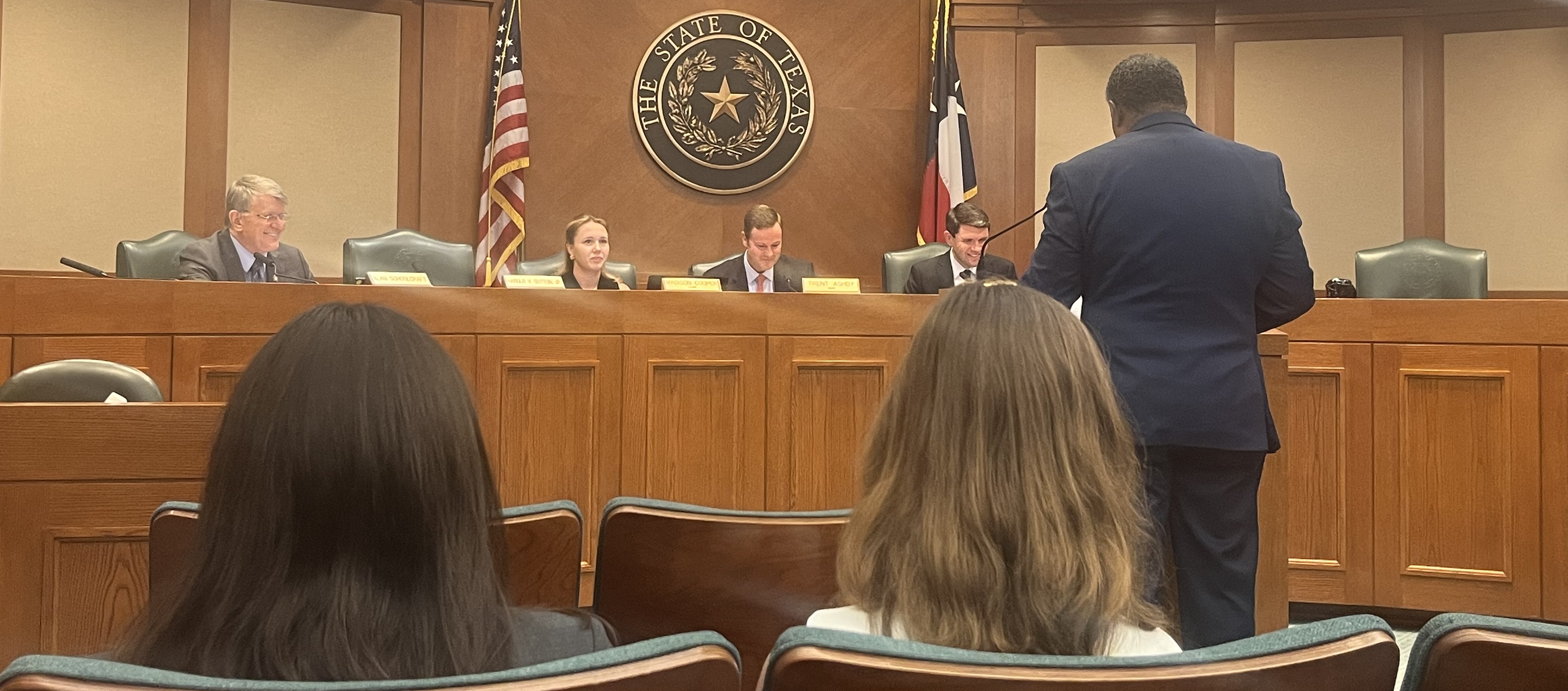New School Year, New Laws: School Safety

Texas Legislature School Safety
Date Posted: 8/26/2019 | Author: Andrea Chevalier
 In the aftermath of the shooting at Santa Fe High School in May 2018, Gov. Greg Abbott hosted a series of roundtable discussions to gather input from students, teachers, lawmakers, law enforcement and other stakeholders, including ATPE state officers, on how to prevent such a tragedy from reoccurring. Additionally, Lt. Gov. Dan Patrick created the Senate Select Committee on Violence in Schools and School Security, which held a series of hearings to generate legislative recommendations. Both the roundtables and the hearings considered issues ranging from hardening school facilities to mental health to gun control. Similar discussions are taking place now in a new set of roundtable discussions convened by Gov. Abbott following another shooting in El Paso this month.
In the aftermath of the shooting at Santa Fe High School in May 2018, Gov. Greg Abbott hosted a series of roundtable discussions to gather input from students, teachers, lawmakers, law enforcement and other stakeholders, including ATPE state officers, on how to prevent such a tragedy from reoccurring. Additionally, Lt. Gov. Dan Patrick created the Senate Select Committee on Violence in Schools and School Security, which held a series of hearings to generate legislative recommendations. Both the roundtables and the hearings considered issues ranging from hardening school facilities to mental health to gun control. Similar discussions are taking place now in a new set of roundtable discussions convened by Gov. Abbott following another shooting in El Paso this month.
At the start of the 86th Legislative Session, Gov. Abbott gave school safety and mental health legislation special expedited status by declaring these issues as emergency items. Lawmakers then deliberated on these issues and passed several bills aimed at helping to prevent future tragedies involving violence in schools. In this week's installment of "New School Year, New Laws," we will fill you in on some changes you can expect in your school when it comes to safety.
The following bills go into effect in the 2019-20 school year:
Senate Bill (SB) 11 by Sen. Larry Taylor (R-Friendswood): Omnibus School Safety Bill
SB 11, which was effective with Gov. Abbott's signature on June 6, 2019, made a big policy statement about how Texas "thinks" about school safety. The bill emphasizes student mental health and incorporates many strategies to address the psychological factors of school violence in addition to other practices, such as school hardening and emergency preparedness. Here are some ways the bill could impact you:
- School safety allotment: Districts are set to receive $100 million over the next two years from a new "school safety allotment." These funds are estimated at $9.72 per student in average daily attendance and can be used to secure facilities, purchase security technology, hire security and mental health personnel, and provide training (including programs to address adverse childhood experiences).
- Training and professional development: Since 2005, districts have been required to create multi-hazard emergency operations plans to address preparedness (including employee training) and responses to a variety of emergency situations, such as weather events. SB 11 adds a requirement that these plans cover a variety of new preparedness provisions, including ensuring employee training for suicide prevention, psychological first aid, and grief-informed and trauma-informed care. District employees, including substitute teachers, must also be trained in responding to an emergency.
- Campus changes: Employees must have classroom access to a telephone or other communication device that allows for immediate contact with emergency services. Additionally, each campus will be required to establish a threat assessment and safe and supportive school team. Team members must include those with expertise in classroom instruction, special education, counseling, and school administration, among others.
Read our session recap coverage of SB 11 in this blog post by ATPE Lobbyist Mark Wiggins for more information.
House Bill (HB) 19 by Rep. Four Price (R-Amarillo): Mental Health Resources
HB 19 utilizes local mental health authorities (LMHAs) to provide mental health resources to public schools. LMHAs are community mental health centers that contract with Texas Health and Human Services to provide services to specific geographic areas. (Find your LMHA here). Under HB 19, LMHAs will employ a non-physician mental health professional to collaborate with the Education Service Center (ESC) in their region and serve as a mental health and substance use resource for that ESC's school districts. HB 19 is effective on Sept. 1, 2019. This means you might start to see the mental health professional providing training for school district personnel early this school year, if your district has decided to participate in the program. The mental health professional is required to provide monthly training on mental health first aid, the effects of grief and trauma, and substance abuse prevention and intervention. The legislature appropriated $4.6 million dollars to provide grants in order to implement this bill.
HB 1387 by Rep. Cole Hefner (R-Mount Pleasant): Removing the Cap on School Marshals
In 2013, the 83rd Texas Legislature created the school marshal program. School marshals are employees, such as teachers and principals, who are appointed by the governing body of public school districts, charter schools, two-year public junior colleges, and private schools. The individual must have a valid license to carry firearms, pass a psychological exam, and complete an 80-hour school marshal course. Due to the secretive nature of the program (marshals are anonymous), it is unclear exactly how many school marshals there are in Texas or how many districts are participating. Since the enactment of the law, the number of school marshals in a district has been limited to the greater of either one marshal per 200 students in average daily attendance per campus or one marshal per building of the campus where students are regularly being taught. Under HB 1387, this limit on the number of marshals is removed. This law goes into effect Sept. 1, 2019.
HB 2195 by Rep. Morgan Meyer (R-Highland Park): Active Shooter Policy and Training
HB 2195 adds that district multi-hazard emergency plans should also include a policy for responding to an active shooter and that school district peace officers or resource officers must complete an active shooter response training. This law took effect immediately after it was signed by the governor on June 14, 2019.
The following bill will begin to impact educators in the 2020-21 school year:
HB 18 by Rep. Price (R-Amarillo): Public School Mental Health Training, Curriculum, and Continuing Education
HB 18 addresses school safety with a focus on professional development and curriculum regarding student mental health and substance abuse. Here are some ways the bill might impact you in the near future.
- Training and professional development: HB 18 will affect professional development by adding required training on students receiving special education or Section 504 services, students who are engaged in substance abuse or those with mental health conditions, and students with intellectual or developmental disabilities. Under HB 18, these mandatory topics and others already in state law must comprise at least 25 percent of the five-year training cycle. Current law limits them to not more than 25 percent. Educators will also get double the credit hours for completing an evidence-based continuing education program in mental health first aid or grief-informed and trauma-informed care. In 2020-21, district-provided staff development can include positive behavior intervention and supports and must include training on suicide prevention, responding to grief and trauma, recognizing the signs of mental health conditions, bullying, and strategies for positive relationships among students.
- Curriculum: Effective Dec. 1, 2019, the health curriculum that may be offered in your school will integrate mental and physical health instruction, to include skills such as managing emotions and maintaining positive relationships. If you are a health teacher, get ready to see the State Board of Education propose new curriculum standards (TEKS) that include science, risk factors, and causes of substance abuse.
Though HB 18 will be effective on Dec. 1, 2019, any new requirements on school districts will not take effect until the 2020-21 school year.
Next Monday, re-visit the Teach the Vote blog for ATPE's next post in this series: Curriculum and Instruction.
CONVERSATION
RECOMMENDED FOR YOU

04/24/2025
Subcommittee on Academic and Career-Oriented Education holds quick meeting on two bills
HB 1209 by Rep. Charles Cunningham (R–Kingwood) is designed to prohibit schools from adopting four-day school weeks.

04/23/2025
House Public Education Committee tackles recapture bills
The House Public Education Committee met Tuesday for the first time since passage of school finance and voucher legislation April 16 and 17.

04/21/2025
Make your plan to vote in the May 3 election
School board seats plus bond propositions may be on your ballot. Early voting runs April 22–29, and Election Day is May 3.

